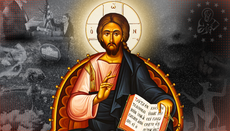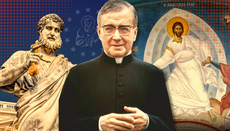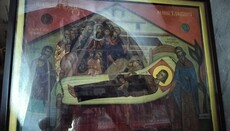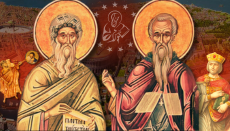St. Swithun of Winchester, the Wonderworker

From Volume II of The Saints of Anglo-Saxon England, by Vladimir Moss
St. John of Shanghai and San Francisco — who Fr. Seraphim Rose called a new Enlightener of the West — was zealous for the restoration of pre-schism Western saints to the liturgical calendars of the Church Abroad. He worked tirelessly to compile their lives and spread their veneration, for which we are in his debt. The fruit of his work can be seen in icons which adorn our churches, but also in the annual liturgical calendar produced by the St. Herman of Alaska Brotherhood, established with the blessing of St. John himself.
As I perused the St. Herman's Calendar (this year's edition dedicated to the Orthodox Saints of Wales), I stumbled upon the name of St. Swithun of Winchester. I quickly pulled out Vladimir Moss's three volume The Saints of Anglo-Saxon England, and found the life of St. Swithun.
Our Holy Hierarch and Father Swithun of Winchester, commemorated July 15/28, is one of the great Wonderworking Saints of the Anglo-Saxon period, when Orthodoxy still flourished in the British Isles. Below, the reader will find the account of the uncovering of his relics, which became a fountain of grace. So abundant were the miracles which occurred when his relics were uncovered that word spread like wildfire, reaching Rome in short order.
Holy Hierarch Swithun of Winchester, pray to God for us!
The holy bishop of Winchester, Swithun, who had been the childhood instructor of Kung Alfred, reposed on July 2, 862, and was buried just outside the west door of the Old Minster. For over a hundred years, his memory was forgotten, and, as he had wished, people walked over his grave on their way to church without knowing who it was they were stepping on. But the Lord did not wish this light to remain hidden under a bushel; and on July 15, 971 his relics were translated into the cathedral to the accompaniment of a greater outpouring of miracles than had ever been seen in Orthodox England.
About twenty years later, this event was recorded by Abbot Alfric in an account that gives a vivid picture of tenth-century English life:
"For three years before the saint was translated into the church from the stone coffin which now stands inside the new building, he appeared in a vision to a certain faithful blacksmith, wonderfully arrayed, and said: 'Do you know the priest Edsige, who with the other priests was driven out of the old monastery by Bishop Ethelwold for their misconduct?' The smith then answered the venerable Swithun as follows: 'I knew him long ago, sir, but he left this place, and I do not know for certain where he is living now. Then the holy man said again to the old smith: 'He is now living in Winchcombe. This is the truth. And now I adjure you in the name of Christ: go quickly and give this message, that Swithun the bishop has commanded him to go to Bishop Ethelwold and say that he must himself open my grave and bring my bones inside the church: for he has been counted worthy that in his time I should be made known to men.'
"Then the smith said to him: 'O sir, Edsige will not believe my words'."
"Then the bishop said again: 'Let him go to my grave and pull a ring out of the coffin; and if the ring yields at the first tug, then he will know for certain that I have sent you to him. If the ring will not come away easily, then he will by no means accept what I say. And after that tell him that he must amend his ways in accordance with the will of the Lord, and hasten single-mindedly to eternal life. And tell everyone that as soon as they open my grave they will find such a valuable hoard that their precious gold will be as nothing by comparison." Then holy Swithun vanished from the smith's sight.
"However, he did not dare to tell anyone about this vision, fearing to be regarded as an untruthful messenger. So the holy man spoke to him again, and yet a third time, and severely reproved him for not acting in obedience to his commands. Then at last the smith went to his burial-place, and, albeit fearfully, took hold of a ring, crying out to God: 'O Lord God, the Creator of all things, grant me, a sinner, to pull this ring out of the lid, if he who spoke to me three times in a dream is really lying here inside. Then he pulled the iron out of the stone as easily as if it had stood in sand, and wondered greatly at what had happened. Then he put it back in the hole and pressed it in with his foot. Again it stuck so firmly that no one was able to pull it out. The smith went away awestruck, and in the marketplace, he met a serf of Edsige's, to whom he related exactly what Swithun had commanded him, earnestly beseeching him to report it to his master."
"The serf consented, but at first did not dare to tell his master, until he felt that no good would come from concealing the saint's command. Then he told him in order what Swithun had commanded. Now at that time Edsige avoided Bishop Ethelwold and all the monks who were in the minster because of his ejection by although the saint was a blood-relative of his. Within them. So he did not obey the saint's command, two years, however, he retreated to that same monastery, and by the grace of God became a monk, continuing there until he departed this life. Blessed is Almighty God, Who humbles the proud while exalting the humble to high estate, and corrects the sinful while always preserving the good who hope in Him!"
"Again, there was certain poor peasant, awfully hunch-backed and bent over in consequence, to whom it was revealed in a dream that he would obtain health and recovery from his crippled state at Swithun's sepulchre. And so, he arose joyfully in the morning, crept on two crutches to Winchester and sought the saint as he had been instructed, praying for his health on bended knee. Then he was healed by the holy bishop, so that no trace of the hump which had oppressed him could be seen. At that time the monks did not know about St. Swithun, thinking that some other saint had healed the man. But the peasant said that it was Swithun who had healed him, for he knew best about the matter."
"A certain man was afflicted with a very distressing disease, so that he could hardly open his eyes, or utter a word, but lay in torment thus, despairing of his life. Then all his friends wanted to carry him to the New Minster, to [the relics of] St. Judoc, so that he could recover his health there. But someone told them that it would be better for them to take the sick man to the Old Minster, to Swithun's grave. This they did, and that night they kept vigil at the grave with him, praying to Almighty God to grant the sick man health through St. Swithun. The sick man also watched until daybreak. Then he fell asleep, and it seemed to all of them as if the tomb was rocking, while to him it seemed as if someone was dragging one of his shoes off his feet. Suddenly he awoke, healed by the holy Swithun. They looked carefully for the shoe, but no one could find it. So, they returned home with the man who had been healed."
"Through the power of God eight sick men were miraculously healed at the holy tomb before the body was removed from it."
"After these signs, King Edgar desired the holy man's exhumation, and told the venerable Ethelwold to translate it with great pomp. Then Bishop Ethelwold, accompanied by abbots and monks, took up the saint and bore him into the church of St. Peter. There he remains in honor, working miracles."
"Then within three days four sick men were healed by the holy man; and there were few days within the next five months in which at least three sick people were not healed sometimes five or six, or seven or eight, ten or twelve, sixteen or eighteen. Within ten days two hundred men had been healed, and so many within twelve months that no one could count them. The cemetery was filled with cripples, so that people could hardly get into the minster. And within a few days they were all so miraculously healed that one could not find a sick man in the whole of that vast crowd."
"Another man," continues Abbot Alfric, "had been blind for seven whole years. He had a guide who led him everywhere. One day he went out, but the guide became angry and left him. At a loss how to return home, the blind man cried out to God and St. Swithun in great anguish. He was immediately healed and returned home joyfully without a guide, for which his relatives thanked God fervently."
"Then the venerable and blessed Ethelwold, who was the bishop of Winchester at that time, commanded all the monks who were living in the monastery to go in procession to the church and praise the saint with hymns, and in this way to magnify God because of the great saint every time a sick man was healed. This they did immediately and sang the Te Deum so often — sometimes three, sometimes four times in a night — that they came to hate getting up to do this, as they wanted to go on sleeping. At length they gave up the chanting altogether, for the bishop was busy with the king and had no means of knowing that they were not chanting the Te Deum continually."
"Then St. Swithun himself came, wonderfully adorned, to a certain good man, and said, 'Go now to the Old Minster and tell the monks that God very much dislikes their murmuring and sloth, for they see God's wonders among them every day but will not praise Christ with chanting as the bishop told the brethren to do. And tell them that if they do not sing the hymn, immediately the miracles will cease. However, if they sing the Te Deum every time a miracle is performed and a sick man healed, then so many miracles will be wrought among them that no one will be able to remember so many miracles having been wrought in his lifetime by anyone."
"Then the man awoke from that joyous sleep, lamenting that he could no longer see the bright light which he had seen around Swithun. He arose, however, and went quickly to Bishop Ethelwold, and told him all that had happened. Ethelwold then immediately sent from the king's court to the monks, and told them to sing the Te Deum as he had commanded, with the warning that anyone who neglected this would heavily atone for it by seven days' continuous fasting. From that time they always observed this custom, as we ourselves have very often seen; for we have not infrequently sung this hymn with them..."
"We cannot write," concludes Alfric, "nor recount in words, all the miracles the holy Swithun wrought by the power of God in the sight of the people, both on prisoners and on the sick, to manifest to men that they, like Swithun who now shines out through his miracles, may be counted worthy of the Kingdom of heaven by good works. Both wall of the old church were hung, from end to end, with crutches and the stools of cripples who had been healed there. Even so they could not put half of them up..."









